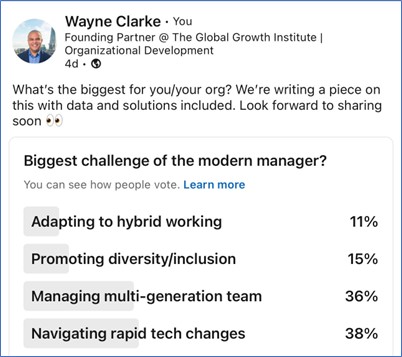The time for task allocation is over: What are the four principal challenges of the modern manager?
- 6 Min Read
Wayne Clarke discusses the four principal challenges facing the modern manager, drawing on a World Class Manager program survey, encompassing a community of 15,000 managers across 30 countries.
- Author: Wayne Clarke
- Date published: Nov 28, 2023
- Categories

The role of a modern manager is unrecognizable from its former self. Whereas the focus was once primarily on task allocation, the contemporary manager grapples with a complex tapestry of challenges that have arisen due to technological shifts, global crises, and changing societal values. We have been fortunate to experience first-hand, in over 1000 organizations across the globe, the ever-changing landscape for managers and learn from those adapting to changing environments. In this article, we delve into four principal challenges faced by modern managers, back them up with some of our exclusive global primary research, and provide some viable solutions.
1. Adapting to the hybrid working model
Navigating the transition to a hybrid working model has become a pressing concern for businesses across the globe. This new paradigm challenges our traditional notions of a workspace and presents logistical hurdles and dilemmas surrounding team cohesion for forward-thinking managers. At the heart of these challenges lies the crucial task of maintaining meaningful dialogue and nurturing connections within teams. Not easy!
Our World Class Manager program survey, encompassing a community of 15,000 managers across 30 countries, revealed that only 60.9% of managers felt confident in their understanding of their teams’ communication methods. This prompts a vital reflection: How in tune are your managers with their teams’ communication dynamics?
To excel in this hybrid landscape, the modern manager must be proactive in forging strong relationships that bridge both the physical and digital realms. This involves a commitment to consistent check-ins, innovative virtual team-building initiatives, and a lucid understanding of each team member’s role. Such endeavors not only enhance communication but also instill a sense of unity and belonging, ensuring teams remain cohesive even when miles apart.
This not only demonstrates the skill sets that we must nurture but also the type of individuals who should (or shouldn’t) be promoted or placed into people manager roles, which is a different debate entirely!
2. Fostering inclusion and wellbeing as a modern manager
Inclusion and well-being are intrinsically linked, serving as the backbone of a thriving workplace. When a workplace is a diverse tapestry of cultures, identities, and viewpoints, it becomes a breeding ground for innovation and paves the way to business success.
However, a vital question arises: how can managers harness this wealth of potential, especially when 45% of managers we surveyed admitted to lacking confidence in engaging with their teams? The solution begins with developing and strengthening our managers. Regular diversity training is essential, bolstering their confidence to actively identify and address biases. By integrating strategies such as mentorship schemes, transparent recruitment processes, and establishing open channels for feedback, we create a framework where every individual feels valued and integral to the organization’s fabric.
As the lines dividing work and personal life increasingly blur, particularly with the surge in remote working, managers face challenges in navigating overwork, burnout, and mental health matters. Truly understanding colleagues – their aspirations, passions, and future visions – is pivotal. It deepens the sense of care employees experience, strengthening their bond with the organization.
It’s also imperative for a modern manager to introspect. With only 28% of surveyed managers having a roadmap for their career aspirations, it becomes pivotal to ask: without a guiding star, how can one illuminate the path for others? Advocacy for a balanced work-life equilibrium is a key part, in our opinion, of being a World Class Manager. By honoring non-working hours, facilitating access to mental health tools, and fostering an environment of trust where challenges can be openly discussed, managers can truly champion both inclusion and well-being. For this to happen (and work) we also need the leaders of the organization to be true role models for this. Again, this is a whole different article!
3. Navigating rapid technological advancements as a modern manager
New tools, platforms, and methodologies are constantly introduced, posing a significant challenge for managers intent on ensuring their teams remain both updated and competitive. Adding to this challenge is the evolving nature of our attention spans.
Considering these intricacies, it becomes important for managers to momentarily halt and reassess. Their key task is to optimize their most invaluable resource: time. Adopting a more strategic and intentional approach paves the way for clarity and decisive action. With this foundation, managers can carve out strategies to harness technological progress to their advantage. Meetings are a great place to start here to find timesaving, we found that managers believed that nearly 50% of meetings they attend are useless.
To make this ambition a reality, instilling a culture of continuous learning is crucial. Managers should advocate for consistent training programs, encourage participation in relevant workshops, stay abreast of industry trends, and look to actively learn from any other internal best practices. Such proactive measures guarantee that teams not only adapt to technological changes but also lead from the front.
4. Managing multi-generational teams
Navigating the intricate dynamics of a multi-generational workforce is a pivotal challenge in contemporary workplaces, where teams span from Baby Boomers to Gen Z. Every generational cohort brings to the table its distinct values, work ethos, and anticipations, presenting a nuanced puzzle for managers to solve.
Interestingly, research underscores the importance of this challenge. A staggering 81% of managers surveyedbelieve their organization’s products or services could see improvements. The question then arises: how might we harness the rich tapestry of experiences across these generational divides to elevate the customer experience?
Some other interesting academic research in this area (Jones & Smith, 2021, “Intergenerational Dynamics in the Modern Workplace”), suggests that ‘the linchpin is open communication’. Managers need to immerse themselves in the aspirations, apprehensions, and driving forces of each age group. Implementing initiatives such as intergenerational mentorship schemes and championing a culture of mutual respect can serve as a smart way to drive a more harmonious and high-performing team environment.
What the public say…
We ran a live survey on LinkedIn. Here were the results at the time of writing when it had been live for four days.

By recognizing the challenges and actively seeking solutions, managers can not only navigate the complexities of the contemporary business landscape but also lead their teams to greater success and innovation. Embracing change, promoting inclusion, and fostering open communication will be the cornerstones of effective management in the years to come.









